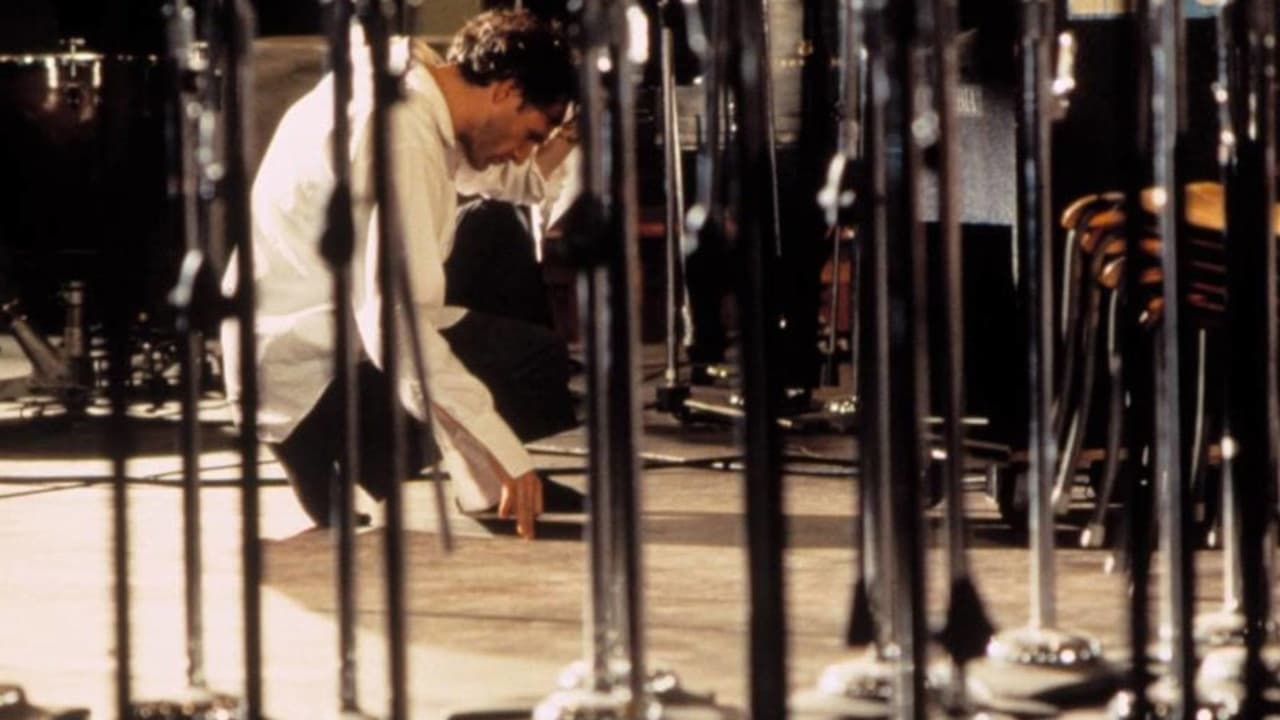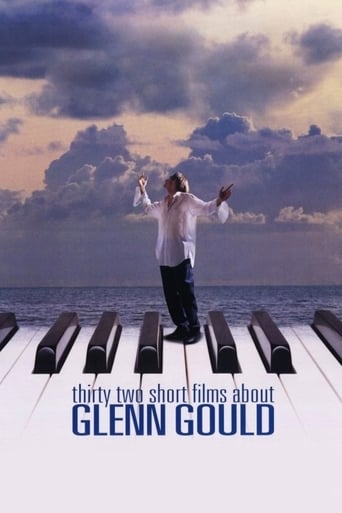Huievest
Instead, you get a movie that's enjoyable enough, but leaves you feeling like it could have been much, much more.
Helloturia
I have absolutely never seen anything like this movie before. You have to see this movie.
Lidia Draper
Great example of an old-fashioned, pure-at-heart escapist event movie that doesn't pretend to be anything that it's not and has boat loads of fun being its own ludicrous self.
Stephanie
There is, somehow, an interesting story here, as well as some good acting. There are also some good scenes
Jackson Booth-Millard
I knew that this film was listed in the book 1001 Movies You Must See Before You Die, as a documentary of sorts I didn't know anything about the subject matter, but with high ratings by critics I was looking forward to it. Basically it is biopic about Canadian pianist Glenn Gould, one of the best-known and most celebrated classical pianists of the 20th century. The difference with this film is there is not a single narrative, it is made up of thirty-one short films, or vignettes (sketches) (the thirty-second film is the end credits), mostly featuring Gould's music.The thirty-two short films are: 1) Aria - a man walking in a white wilderness. 2) Lake Simcoe - Glenn's childhood, his Mother (Katya Ladan) watching him learning to play piano. 3) Forty-five Seconds and a Chair - Glenn Gould (Colm Feore) sat in a chair. 4) Bruno Monsaingeon: musician and collaborator. 5) Gould Meets Gould: text by Glenn Gould - Gould talking to himself in a studio. 6) Hamburg - Gould diagnosed with bronchitis in the lung, then doing a piano recording and doing something with the maid. 7) Variation of C Minor - an animation of an audio wave line. 8) Practise. 9) The L.A. Concert - Gould walking through the theatre corridors meeting people. 10) CD318 - piano playing on stage, with close-ups of they keys, hammers and strings. 11) Yehudi Menuhin: violinist. 12) Passion According to Gould - Gould listening to piano. 13) Opus 1: a Composition by Glenn Gould - four men sitting playing string instruments. 14) Crossed Paths - various friends and colleagues interviewed. 15) Truck Stop - "Downtown" by Petula Clark playing in a roadside diner, there is eavesdropping on many conversations. 16) The Idea of North: A Radio Interview by Glenn Gould. 17) Solitude - Gould walking and talking in the snow with an invisible interviewer. 18) Questions with No Answers - journalists and interviewers asking Gould questions, face to face and on telephone, no responses are heard. 19) A Letter. 20) Gould Meets McLaren: Animation by Norman McLaren - dancing spheres in a forward moving sky. 21) The Tip - phone calls about shares in Sotex. 22) Personal Ad - Gould advertising to find someone as odd as him. 23) Pills - close-ups of drugs, with names and descriptions given, and their side effects. 24) Margaret Pacsu: friend. 25) Diary of One Day - writing of words and number sums on screen, and an x-ray of a body moving and the brain. 26) Motel Wawa - an interview on the telephone, and a window looking out to a beach. 27) Forty-Nine - Gould in a phone booth. 28) Jessie Greig: cousin. 29) Leaving - driving and Gould dying, following a stroke he suffered brain damage and was taken off life support. 30) Voyager - a space shuttle launch. 31) Aria - a repeat sequence. 32) End Credits.Also starring Derek Keurvorst as Gould's Father, Devon Anderson as Young Glenn Age 3, Joshua Greenblatt as Young Glenn Age 8, Sean Ryan as Young Glenn Age 12, Kate Hennig as Chambermaid and Sean Doyle as Porter. Feore gives a remarkable performance as the talented musician, the music of the real Gould is beautiful and goes well with the scenes, the editing is well done, and each segment, whether its acted, an interview or animated adds something different, you can draw your own conclusion of the real man being focused, a brilliantly crafted and most interesting biographical drama. Very good!
rooprect
I realize that this is a well made film, and many people, Gould fans or not, enjoyed it very much. But on the chance that someone out there is on the same wavelength as me, I'll tell you why I didn't like it.The film paints the picture of a self-absorbed, eccentric oddball... a bit arrogant and presumptuous (like when he grabs a lowly chambermaid and makes her listen to one of his records as a sort of reward for her day's work). The Glenn Gould character always speaks in a supercilious New England tone of voice (think Frazier but without the jokes). He says phrases like "never the twain shall meet". If you're like me, you might have a healthy mistrust of people who say "twain" unless they're talking about Huck Finn. Maybe you can guess the problem: unless you're already convinced that Glenn Gould is god's gift to Carnegie Hall, the film offers no motivation to like him.This could have been EASILY remedied by showing a performance to earn the audience's respect. It could have been an archival clip, or even a semi-convincing pantomime by the actor playing Gould if done convincingly would have made me take the character more seriously. But we never get that. So the result is a whole bunch of people telling us how great he is, including the Diva himself. It gets irritating.I feel like the real Glenn Gould was cheated. Here is a film, purportedly in honor of a great musician, which never shows him being a musician. Instead we get a lot of ponderous scenes of (the actor playing) Glenn as he walks across frozen lakes, or sits in a chair unmoving with an intense expression on his face, or waving his arms dramatically in the air while listening to the playback of one of his recordings. People around him are made to look like simpletons for not being on the same supernatural level as Gould. They chatter about coffee or gardening while the maestro slips further away into a lofty dreamworld that we mortals cannot dare understand. The entire film thus takes a very condescending air, telling us that Gould was a misunderstood genius yet not offering to show us what exactly was genius about him.I read that the actor playing Glenn chose not to be shown playing the piano out of respect for Mr. Gould. Could someone please explain that to me? It's OK to act like someone being a goofy oddball dancing to invisible pianos in his head, but it's somehow disrespectful to portray him actually playing one?I was not familiar with Glenn Gould before I watched this, and 90 minutes later I'm still completely clueless. Even worse, I'm not particularly inclined to learn more. I believe this film is great for people who are already fans of Gould, or perhaps casual fans of classical music as a whole. Me, I'm a hardcore classical music fan who never happened to hear Glenn Gould (there are so many amazing musicians out there, it happens).If I were to list the best musical documentaries & biopics I've seen, they would be "Standing in the Shadows of Motown" about the unsung studio musicians who made it happen, "Anvil! The Story of Anvil" a hilarious and heartfelt documentary about a bunch of aging rockers who never say die, and of course the masterpiece "Amadeus" which, like this film, shows the maestro as an arrogant oddball, but it shows powerful musical performances which instantly earn our respect and interest. Really, just one lousy performance would've made all the difference, but alas I can't say this movie impressed me.
apass
Let me preface this review by saying: the music of Bach permeates my existence. Over the years, I've listened to nearly every recording there is, repeatedly. That said, I had trouble watching this movie. The first time I tried, I quit after five minutes. Last evening, I made it all the way through. While at times moving, the film disturbs.For one, it does not do visual justice to the music. Bach's compositions are not about waving hands in the air, geometry animations, or men walking off into infinity. They're complex literary statements. This variety of music is akin to the best silent cinema; it says volumes, but without words. Like pantomime, it tells a nuanced story, weaving multiple plot lines together into an evocative fabric. Few of the 32 vignettes approached that ideal. Could it be that some of Bach's greatest admirers fail to grasp the deeper meaning within the music? In addition, Gould's personal faults grate on the nerves. It's clear he wasn't an ideal specimen. He mistook music for life. Music is a condiment, a catalyst perhaps. It frames life, drawing attention to worthy matters. It spices and enlivens life, making it savory. But it is not life. His mind was filled with picture frames, but no pictures. He fell in love with music in the same way that parrots sometimes mistakenly bond with their human owners. They are not parrots, and music is not a woman. One wonders how Bach might greet Gould in heaven: "So, the bachelor thinks he understands the man with two wives and twenty children? Let's see what kind of music you'll play after we give you a well-rounded life."
darthmaus
'Thirty Two Short Films About Glenn Gould' will not appeal to everybody: it is not a traditionally narrative biographical documentary, and it will not present much in the way of the facts of Gould's existence. Rather, it attempts to portray many facets of his eccentric and self-centered genius largely by non-narrative means. There are a few documentary-style interviews, but I found these to be simply providing background for the dramatizations and visuals used to bring out his character.Gould's passions, quirks, and personality are presented with Colm Feore's decent likeness and obviously very thoroughly researched character development. Story takes a back seat to image and music, and the result for the audience is a feel for the persona of Glenn Gould, rather than the story of his life.I am biased, as a Canadian and a lover of Gould's music, but this is one of my all-time favourite films.

